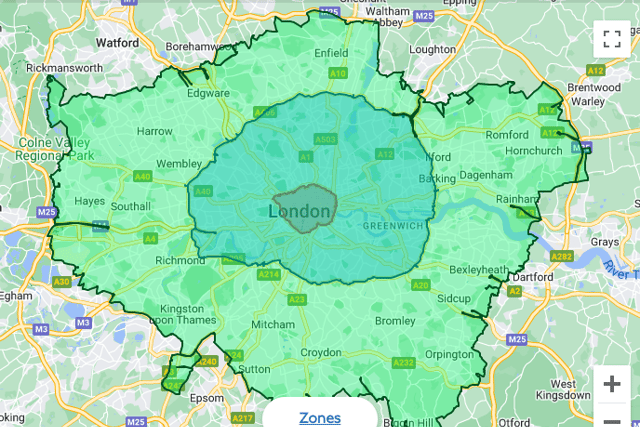ULEZ: TfL says ‘correct processes’ followed when erecting cameras and signs
and live on Freeview channel 276
Transport for London (TfL) said it has followed “all the correct permitting processes” when erecting Ultra-Low Emission Zone (ULEZ) cameras and signs, amid accusations it is “showing contempt for the legal process”.
Four outer London boroughs have said they are “furious” at TfL for installing ULEZ monitoring equipment despite an ongoing judicial challenge into the mayor’s scheme.
Advertisement
Hide AdAdvertisement
Hide AdThe coalition, comprising Bexley, Bromley, Harrow and Hillingdon, plus Surrey County Council, launched the judicial review opposing the planned extension of the ULEZ, to incorporate all of greater London on August 29.
Under the expanded zone, most drivers of non-compliant vehicles in greater London will be liable to pay a £12.50 daily charge.
The mayor, Sadiq Khan, has said the extension is necessary as “around 4,000 Londoners are dying prematurely every year due to toxic air, children are growing up with stunted lungs and thousands of people in our city are developing life-changing illnesses attributable to pollution, such as cancer, lung disease, dementia and asthma”.
A £110 million scrappage scheme was announced by the mayor in an effort to support those having to transition to cleaner vehicles.
Advertisement
Hide AdAdvertisement
Hide Ad

‘A staggering level of contempt’
The erection of ULEZ cameras and signs in outer London have elicited anger from some residents, with posts online showing cameras with cut wires and others covered with boxes, preventing any footage being captured.
The leaders of the four London councils involved in the judicial review have also spoken out against the installations, with Cllr Ian Edwards, leader of Hillingdon Council, describing it as showing “a staggering level of contempt from the mayor”.
He continued: “One of our grounds for challenge was that the outcome of last year’s ULEZ consultation was predetermined. The appearance of these cameras is further evidence that for the mayor this expansion proposal is a fait accompli.
Advertisement
Hide AdAdvertisement
Hide Ad“But this coalition will not flex to his will and questions the lawfulness of this installation by stealth of his cameras, which has understandably caused huge upset to residents who are relying on us to protect them from the financial devastation the ULEZ expansion would cause for so many families and businesses.”
Leader of Bexley Council Teresa O’Neill said: “We are furious that TfL are pushing ahead with their preparations for the expansion of the ULEZ when the legal challenge brought by this coalition of councils is being considered.
“The mayor has ignored the wishes of those who contributed to the consultation, to those who voted in our elections last May, he’s now ignoring these councils and showing contempt for the legal process that has not yet concluded.”
Cllr Colin Smith, leader of Bromley Council, and Cllr Paul Osborn, leader of Harrow Council, also voiced their anger at the installation of the ULEZ cameras and signs in their boroughs, with Cllr Smith describing the judicial review as “a battle that we really must win for all of those affected”.
TfL’s response
Advertisement
Hide AdAdvertisement
Hide AdResponding to the councils’ concerns, a TfL spokesperson reiterated the necessity of cleaning up London’s air to improve the health of its residents.
They said: “The mayor has been clear that his decision to expand the ULEZ should be implemented without delay when around 4,000 Londoners are dying prematurely every year due to toxic air, children are growing up with stunted lungs and thousands of people in our city are developing life-changing illnesses attributable to pollution, such as cancer, lung disease, dementia and asthma.
“We are working closely and collaboratively with the local authorities concerned to install the infrastructure needed. Where cameras and signs have been installed, all the correct permitting processes have been followed.”
